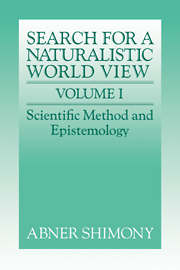Book contents
- Frontmatter
- Contents
- Acknowledgments
- A THE DIALECTIC OF SUBJECT AND OBJECT
- 1 Integral epistemology
- 2 Reality, causality, and closing the circle
- 3 Search for a worldview which can accommodate our knowledge of microphysics
- B PERCEPTION AND CONCEPTION
- C EPISTEMIC PROBABILITY
- D INDUCTIVE INFERENCE: THE DIALECTIC OF EXPERIENCE AND REASON
- E FACT AND VALUE
- Index
1 - Integral epistemology
Published online by Cambridge University Press: 21 December 2009
- Frontmatter
- Contents
- Acknowledgments
- A THE DIALECTIC OF SUBJECT AND OBJECT
- 1 Integral epistemology
- 2 Reality, causality, and closing the circle
- 3 Search for a worldview which can accommodate our knowledge of microphysics
- B PERCEPTION AND CONCEPTION
- C EPISTEMIC PROBABILITY
- D INDUCTIVE INFERENCE: THE DIALECTIC OF EXPERIENCE AND REASON
- E FACT AND VALUE
- Index
Summary
This essay is both an appreciation of the epistemological contributions of Donald Campbell and a statement of an epistemological program which is different from his in several respects.
In a lecture to the Boston Colloquium for the Philosophy of Science in 1977, he said:
What I am doing is “descriptive, contingent, synthetic epistemology.”… I make a sharp distinction between the task and permissible tools of descriptive epistemology on the one hand and traditional, pure, analytic, logical epistemology on the other. Descriptive epistemology is a part of science rather than philosophy, as that distinction used to be drawn by philosophers. It is science of science, scientific theory of knowledge, were those terms not too pretentious for the present state of the art.
While I want descriptive epistemology to deal with normative issues, with validity, truth, justification of knowledge – that is, to be epistemology – descriptive epistemology can only do so at the cost of presumptions about the nature of the world and thus beg the traditional epistemologist's question [Campbell, 1977a, p. 1].
Campbell's resolute restriction of his investigations to descriptive epistemology is both his great strength and his weakness. It is his strength because it frees him, at one stroke, from the slow-paced type of inquiry that dominates the literature of analytic epistemology: for example, “When I see a tomato there is much that I can doubt” (Price, 1932, p. 33).
- Type
- Chapter
- Information
- The Search for a Naturalistic World View , pp. 3 - 20Publisher: Cambridge University PressPrint publication year: 1993



